

Envy. Portrait of a Woman Suffering from Obsessive Envy; Jean Louis Théodore Géricault (1791–1824) Envy (from Latin invidia) is an emotion which "occurs when a person lacks another's superior quality, achievement, or possession and either desires it or wishes that the other lacked it"[1] Bertrand Russell said that envy was one of the most potent causes of unhappiness.[2] Not only is the envious person rendered unhappy by his envy, but they also wish to inflict misfortune on others.
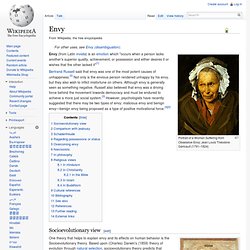
Although envy is generally seen as something negative, Russell also believed that envy was a driving force behind the movement towards democracy and must be endured to achieve a more just social system.[3] However, psychologists have recently suggested that there may be two types of envy: malicious envy and benign envy—benign envy being proposed as a type of positive motivational force.[4][5] Socioevolutionary view[edit] Comparison with jealousy[edit] Money. A sample picture of a fictional ATM card.

The largest part of the world's money exists only as accounting numbers which are transferred between financial computers. Various plastic cards and other devices give individual consumers the power to electronically transfer such money to and from their bank accounts, without the use of currency. Saint Patrick's Day. Saint Patrick's Day, or the Feast of Saint Patrick (Irish: Lá Fhéile Pádraig, "the Day of the Festival of Patrick"), is a cultural and religious holiday celebrated annually on 17 March, the death date of the most commonly-recognised patron saint of Ireland, Saint Patrick (c.
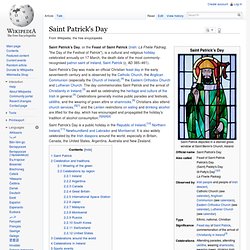
AD 385–461). Saint Patrick's Day was made an official Christian feast day in the early seventeenth century and is observed by the Catholic Church, the Anglican Communion (especially the Church of Ireland),[4] the Eastern Orthodox Church and Lutheran Church. Saint Patrick's Day is a public holiday in the Republic of Ireland,[10] Northern Ireland,[11] Newfoundland and Labrador and Montserrat. It is also widely celebrated by the Irish diaspora around the world; especially in Britain, Canada, the United States, Argentina, Australia and New Zealand. Saint Patrick[edit] Much of what is known about St Patrick comes from the Declaration, which was allegedly written by Patrick himself. Spring (season) Colorful spring garden flowers Meteorologists generally define four seasons in many climatic areas: spring, summer, autumn (fall) and winter.
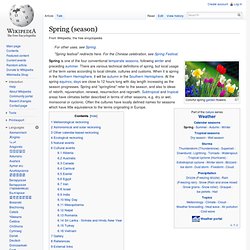
These are demarcated by the values of their average temperatures on a monthly basis, with each season lasting three months. The three warmest months are by definition summer, the three coldest months are winter and the intervening gaps are spring and autumn. Spring, when defined in this manner, can start on different dates in different regions. Islam. Islam (/ˈɪslɑːm/;[note 1] Arabic: الإسلام, al-ʾIslām IPA: [ælʔɪsˈlæːm] ( )[note 2]) is a monotheistic and Abrahamic religion articulated by the Qur'an, an Islamic holy book considered by its adherents to be the verbatim word of God (Allāh), and for the vast majority of adherents, also by the teachings and normative example (called the Sunnah and composed of hadith) of Muhammad (c. 570–8 June 632 CE), considered by most of them to be the last prophet of God.

An adherent of Islam is called a Muslim. Most Muslims are of two denominations: Sunni (75–90%)[8] or Shia (10–20%).[9] About 13% of Muslims live in Indonesia,[10] the largest Muslim-majority country, 25% in South Asia,[10] 20% in the Middle East,[11] and 15% in Sub-Saharan Africa.[12] Sizable minorities are also found in Europe, China, Russia, and the Americas. Health. Health is the level of functional or metabolic efficiency of a living organism.

In humans, it is the general condition of a person's mind and body, usually meaning to be free from illness, injury or pain (as in "good health" or "healthy").[1] The World Health Organization (WHO) defined health in its broader sense in 1946 as "a state of complete physical, mental, and social well-being and not merely the absence of disease or infirmity. Systematic activities to prevent or cure health problems and promote good health in humans are undertaken by health care providers.
Applications with regard to animal health are covered by the veterinary sciences. Illness. Death due to disease is called death by natural causes.
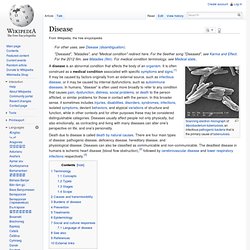
There are four main types of disease: pathogenic disease, deficiency disease, hereditary disease, and physiological disease. Diseases can also be classified as communicable and non-communicable. The deadliest disease in humans is ischemic heart disease (blood flow obstruction),[2] followed by cerebrovascular disease and lower respiratory infections respectively.[3] Youth. A teenager in Italy.
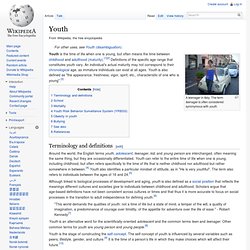
The term teenager is often considered synonymous with youth. Hope. Hope is an optimistic attitude of mind based on an expectation of positive outcomes related to events and circumstances in one's life or the world at large.[1] As a verb, its definitions include: "expect with confidence" and "to cherish a desire with anticipation".[2] In psychology[edit] Dr.
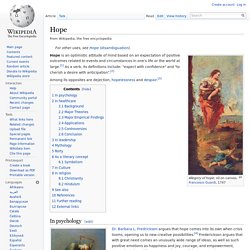
Barbara L. Nature. Nature, in the broadest sense, is equivalent to the natural, physical, or material world or universe.

"Nature" refers to the phenomena of the physical world, and also to life in general. It ranges in scale from the subatomic to the cosmic. Growth. Growth refers to a positive change in size, often over a period of time. Growth can occur as a stage of maturation or a process toward fullness or fulfillment. It can also perpetuate endlessly, for example, as detailed by some theories of the ultimate fate of the universe. The quantity can be: Physical (e.g., growth in height, growth in an amount of money)Abtract (e.g., a system becoming more complex, an organism becoming more mature) It can also refer to the mode of growth, i.e. numeric models for describing how much a particular quantity grows over time.
Biology Social science.